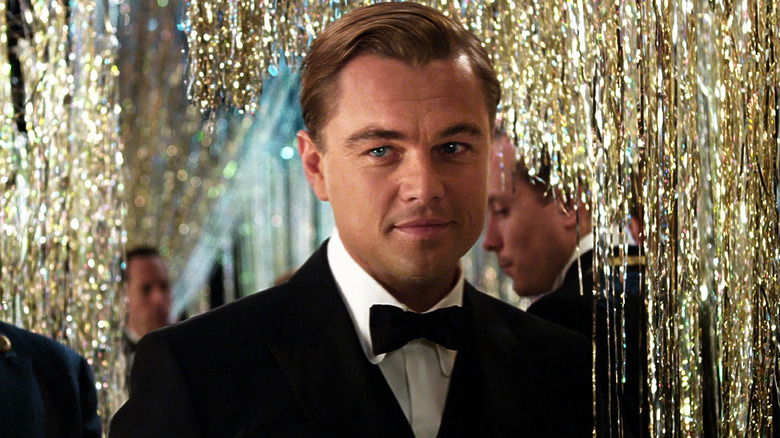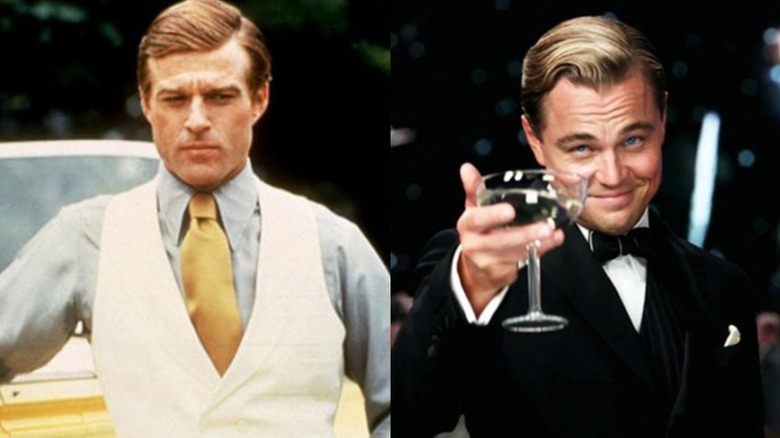Robert Redford And Leonardo DiCaprio Starred In Adaptations Of The Same Banned Book
Amongst the many discussions to be had about the state of Hollywood revolves around the concept of the movie star. Over the last two decades, it appears that audiences have flocked to theaters primarily for pre-existing intellectual properties, with franchises such as Marvel, DC, and "Star Wars" dominating the box office. In some cases, the filmmaker may serve as the marquee, particularly if your name is Christopher Nolan, where you have earned so much trust after years of quality filmmaking with audiences that a three-hour R-rated biopic like "Oppenheimer" can nearly gross $1 billion at the box office. With that in mind, star power no longer carries the same weight that it used to, but there are a few actors who still command such prestige with each of their new releases. One of those actors is Academy Award-winner Leonardo DiCaprio.
In an age where the aura of movie stars seemingly fades, Leonardo DiCaprio continues to endure. Of course, as the male lead of James Cameron's "Titanic," one of the highest-grossing films of all time, you have multiple generations who recall falling in love with him as Jack Dawson. DiCaprio would follow his blockbuster role with acclaimed performances in numerous prestige projects, working with Hollywood titans such as Steven Spielberg, Quentin Tarantino, Christopher Nolan, and most notably, Martin Scorsese. Regarding previous generations of movie stars, an apt comparison to DiCaprio for respect and reputation within Hollywood is Robert Redford. Both actors have received acclaim throughout their careers and have the charm and strapping good looks that the industry loves to promote. Fittingly enough, both DiCaprio and Redford have headlined adaptations of an American literary classic that is a notable banned book.
Robert Redford and Leonardo DiCaprio both brought the titular Great Gatsby to life
Author F. Scott Fitzgerald's 1925 novel "The Great Gatsby" is a seminal piece of American literature. The book is told from the first-person perspective of Nick Carraway, a WWI veteran and Yale University alumnus who moves to New York City to pursue a career as a bond salesman. While there, he meets and befriends his wealthy neighbor, Jay Gatsby, notable for his extravagant parties, who pines for his former lover, Daisy Buchanan, Nick's distant cousin, who is now married to Tom Buchanan. The book has appeared on numerous banned book lists in schools due to its exploration of sex, violence, adultery, and language, but has also been part of high school English class curricula over the years.
There have been numerous adaptations of "The Great Gatsby" through different media. The novel has been brought to life through radio, stage, television, and film. In terms of official theatrical releases that directly adapt the book, there have been four films that were released in 1926 (which is now considered lost media), 1949, 1974, and 2013. The 1974 film, which was directed by Jack Clayton from a screenplay by Francis Ford Coppola, starred Robert Redford as Jay Gatsby, with Mia Farrow as Daisy Buchanan, Bruce Dern as Tom Buchanan, and Sam Waterston as Nick Carraway. Although the film was subject to mixed reception at the time of its release, it received two Academy Award nominations: Best Costume Design and Best Music, winning both. Truman Capote was the original screenwriter for the film, but was replaced by Coppola, who claims that the script he wrote was not sufficiently adapted in the finished product.
"The Great Gatsby" was adapted to film once again in 2013 by director Baz Luhrmann. Leonardo DiCaprio headlined the film as Jay Gatsby, with Tobey Maguire as Nick Carraway, Carey Mulligan as Daisy Buchanan, and Joel Edgerton as Tom Buchanan. Unlike previous adaptations, which fell in line with a more traditional approach, Lurhmann's film echoed his maximalist postmodernist style, which was on display in his previous films "William Shakespeare's Romeo + Juliet," and "Moulin Rouge!" Although some criticized Luhrmann's approach to implementing modern music from artists like Jay-Z into a story set in the roaring twenties, others felt that juxtaposing both eras worked in reflecting how the excesses of party culture get passed down from one generation to the next. Similar to the 1974 film, Luhrmann's adaptations received two Academy Award nominations for Best Costume Design and Best Production Design, winning both.

